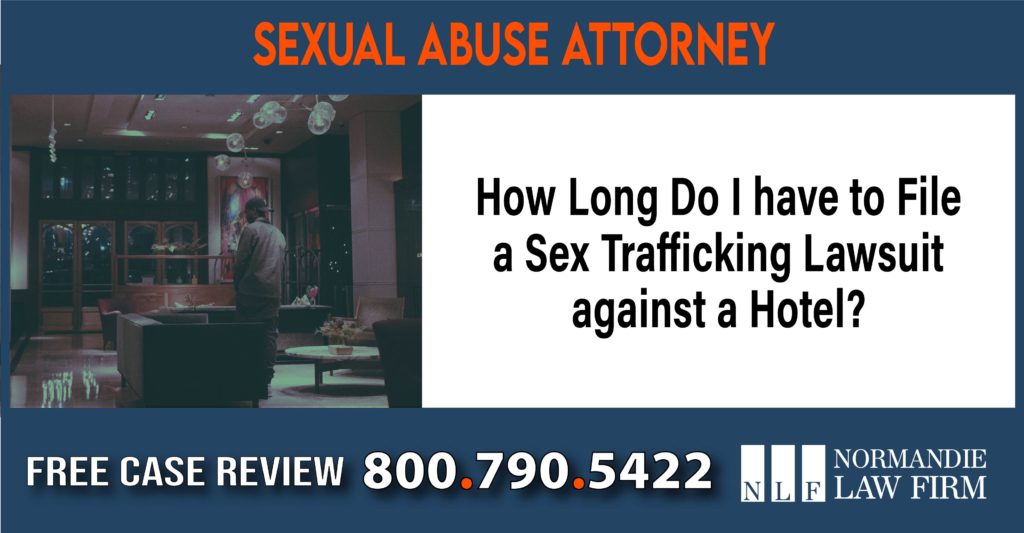Victims who were 18 years or older at the time have 10 years to sue a hotel that fails to report sex trafficking on the property, starting from the latest / most recent incident of sexual abuse. If, on the other hand, you were a minor at the time, the statute of limitations to file a sex trafficking lawsuit is 22 years from your 18th birthday. Basically, you have up until the day you turn 40 to sue a hotel for knowing about and failing to take action on incidents of human trafficking.
With child victims, however, there is another legal standard that applies to the deadline for a lawsuit. The discovery rule for child sexual abuse allows victims to file a lawsuit within 5 years from learning about the emotional or physical harm that was caused by sexual exploitation or assault.
To understand how the discovery rule is applied, let’s consider how a child may react when they suffer a traumatic event. Most kids tend to shut down and try to act like nothing happened, and this is mainly a defense mechanism based on one’s inability to process what they just experienced. Repression of trauma is especially common in children who are being abused in other ways by the perpetrator (physical assault, threats, etc.). That’s why so many youths in this situation push away the painful memories and avoid talking about them, even to their closest relative and friends.
The problem is, continual suppression of trauma from being abused has negative effects on the victim’s psychology, and as a result, those who were sex trafficked suffer from various mental health issues. To someone on the outside looking in, it’s clear that such disorders are caused by sexual abuse during childhood. But it’s not so easy for the victim to make the connection when they have spent a lifetime pushing away these thoughts.
With that in mind, it’s understandable that the realization of illness or injury due to sex trafficking can occur late in the victim’s life, quite possibly when they are past the age of 40. As long as the abuse occurred or began when the victim was under 18, they still have a window of 5 years to sue the hotel and anyone else that’s liable for their pain and suffering.
As you can see, figuring out how long you have for a sex trafficking lawsuit against a hotel is not a black and white issue. This is why you should contact a California sexual abuse lawyer immediately to verify the statute of limitations if you wish to sue a business owner for failure to report sex trafficking at a hotel, motel, or similar rental property.

Our Recent Verdicts and Settlements
$2.5 Million
$600,000
$1.5 Million
$54 Million
$525,000
$1.2 Million
How is a Hotel Liable for Sex Trafficking?
On January 1, 2023, a law known as Assembly Bill 1788 went into effect. Also known as Civil Code section 52.65, this legislation holds hotel owners responsible if they or supervisory employees of the business knew that activities related to human trafficking were taking place on the premises. Such individuals are also required to contact the police or a state / national victim services organization if they suspect this type of activity is occurring at the hotel.
In terms or recognizing the signs of sex trafficking, hotels were already required to provide training on this subject to all their employees. But there were essentially no consequences if staff members failed to do the right thing, i.e., contact the authorities, which is why AB 1788 was recently put into practice. Now, supervisory staff and owners face legal penalties if they do not report human trafficking activity within 24 hours. These include fines starting at $1,000 and going all the way up to $10,000. Trafficked victims and their families may also have grounds to sue for monetary damages, like pain and suffering, mental anguish, and medical expenses.
Frankly, we find that this law is long overdue, considering how hotels are frequently used by traffickers due to the “what happens behind closed doors stays behind closed doors” mentality at these lodgings. Thanks to Assembly Bill 1788, motels, hotels, and resorts are now less favorable environments for sex trafficking.
While combating such crimes is in the hands of lawmakers and law enforcement officers, our focus is on victims and their right to justice if they suffered harm due to someone else’s negligence. If you are a victim of sex trafficking or any other type of sexual abuse, our lawyers are here for you 24 hours a day, 7 days a week. Contact our office and schedule a free consultation to learn about your rights and legal options.
Supervisory Employee as Defined by Hotel Liability for Sex Trafficking Laws
As we mentioned, mandatory reporting of sex trafficking at a hotel is imposed on employees at the supervisory level, which is an important distinction when it comes to who is responsible under the law. In essence, a supervisory employee is someone with subordinates, meaning that they have authority over others, which they can enforce on behalf of the employer. For example, a shift manager has the right to assign duties to cleaners, clerks, kitchen staff, etc., and make recommendations on hirings and firings. So, this is an example of someone that is in a supervisory role at a hotel.
Depending on the type of lodgings, you may find that the owner is the only person that would fit the definition of a “supervisory” employee. Hotel franchises like Econo Lodge or Days Inn will have a team of such individuals to manage all their locations. On the other hand, a privately-owned motel of a dozen rooms or so may be run by the owner and a few part-time workers.
Hotel Liability for Employees Participating in Sex Trafficking Activity
This article is focused on mandatory reporting laws for owners and upper level employees of a hotel when it comes to human trafficking activity. However, hotels can also be sued for the action of any employee if they directly benefit from knowledge of or participating in the trafficking of humans on the property.
The right to sue hotels under these circumstances is based on vicarious liability, a legal concept that holds owners responsible if: 1) an employee caused bodily harm, emotional trauma, and/or property damage to another party due to careless or reckless conduct; and 2) the employee’s negligence or willful misconduct occurred within the scope of their job duties.
For example, a janitor at a hotel may be paid off by traffickers to stay quiet about what goes on inside the rooms. Or, employees at a motel receive a cut of the profits for helping traffickers find victims and keep them trapped on the premises. Since they knowingly benefit “from participating in a venture that the employee knew or acted in reckless disregard of the activity constituting sex trafficking,” the hotel owner can be sued under the state’s liability laws.
How Much is the Average Settlement for Hotel Sex Trafficking Lawsuits?
The average value of a sex trafficking case is between $1,000,000 and $5,000,000, with some cases resulting in awards of over $10,000,000. You tend to see higher settlements on behalf of minors compared to adults, but there are plenty of exceptions to the rule, as the victim’s injuries, their monetary losses, and other factors will ultimately decide how much they are entitled to. Based on decades of representing sex abuse victims, we would say that most lawsuits settle below the $5,000,000 mark, and some cases may be worth less than $750,000. Ultimately, the amount that each victim deserves is based on many details that we can go over with you during a free, private case review.
How Long Do Sex Trafficking Cases Take to Settle?
Settling a failure to report set trafficking lawsuit against a hotel will probably take 1 to 2 years if we go by the average timeline for sexual abuse lawsuits. In actuality, a settlement may be reached within a few months to over 3 years based on many factors that are specific to each case. Overall, sexual abuse claims are extremely complicated lawsuits, and there is generally no short cut to building a solid case and negotiating a settlement that’s adequate for the victim’s level of suffering.
More than 95% of these lawsuits are resolved out of court, so it’s very rare that a case is taken to trial. If that were to happen, 3 or more years may be needed to settle a sex trafficking at a hotel lawsuit. As going to court is unlikely, we are generally looking at a timeline of 12 to 24 months to reach a settlement.
Contact Normandie Law Firm
Advice from an experienced attorney is crucial when you are a victim of sexual exploitation and assault. But many people hesitate to contact a law firm, as they cannot afford to pay the costs associated with legal representation. The burden of legal fees is never on your shoulders here at Normandie Law Firm, where we have a Zero Fee Guarantee. We guarantee that you will pay $0 out of pocket, since we operate on a contingency fee basis. That means our expenses are paid at the end of your case, and only if you receive compensation from the defendant. This way, your finances will not be affected, no matter what happens with your case.
A sex trafficking lawsuit attorney is ready to speak with you during a free case evaluation, so contact our office as soon as possible.













